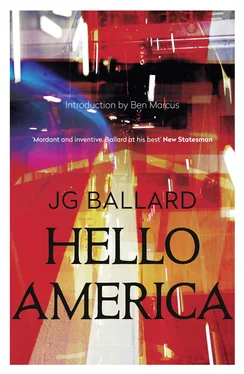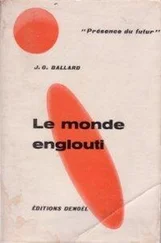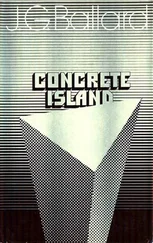A sharp spray rose from the cutwater of the Apollo and stung Wayne’s cheeks. Steiner was ringing down to the engine-room for more steam, and the ship gained speed across the bay, drawn towards the magnetic coast as if by the heavier gravity of this land of dreams. Remembering Steiner’s words – the forty-fifth President? – Wayne thought of his mother again. During her last years in the asylum she often rambled about Wayne’s real father, variously Henry Ford V; the last US President-in-Exile, President Brown (a devoutly religious nonagenarian who had died sixty years before Wayne’s birth in a Zen monastery in Osaka); and a long-forgotten folk singer named Bob Dylan, one of whose records she endlessly played beside her bed on a hand-cranked gramophone.
But once, during a brief moment of lucidity while recovering from an overdose of Seconal, his mother fixed Wayne with a calm eye and told him that his father had been Dr William Fleming, Professor of Computer Sciences at the American University, who had vanished during an ill-fated expedition to the United States twenty years earlier.
Wayne had thought nothing of this odd confession. But while going through the unhappy muddle of his mother’s possessions after her death – a mad antique shop of costume jewellery, newspaper clippings and drug vials—he had come across a ribbon-wrapped set of postcards, signed by Dr Fleming and postmarked ‘Southampton, England’, the expedition’s point of departure. The tone of these brief but intimate messages, the repeated mention of being back for ‘the great day’, and the solicitous interest in this young secretary’s pregnancy had together sown their seed in Wayne’s mind.
Was his obsession with America, which his unknown ancestors had abandoned a century earlier, was his determination to return to this lost continent merely an attempt to find his true father? Or had he invented the quest for his father in order to give his obsession some kind of romantic meaning?
Did it matter now? Wayne pulled himself from his thoughts and gazed through the quickening spray at the Manhattan skyline rising towards him across the vivid water. Like his unknown ancestors centuries before him, he had come to America to forget the past, to turn his back for ever on an exhausted Europe. For the first time since he had stowed aboard the Apollo, Wayne felt a sudden sense of companionship, almost of commitment to his fellow passengers who had braved the long voyage with him.
On either side of him people were pressed against the rail, ignoring the spray whipped up by the rusty bows, members of the crew and the scientific expedition elbow to elbow. Even Dr Paul Ricci for once failed to annoy Wayne. The dapper, self-immersed nuclear physicist was the one member of the expedition whom Wayne disliked – a dozen times during the voyage he had strolled up behind Wayne as he worked in the log-room over the old street-maps of Manhattan and Washington, implying with a smirk that the whole of the United States was already his territory. He now stood beside Professor Summers, calling out landmarks to her.
‘There’s the Ford Building, Anne, and the Arab Quarter. If you look closely you can see the Lincoln Memorial…’
Had his grandparents ever lived in Manhattan, as he claimed? Wayne was about to correct him, but everyone had fallen silent. Orlowski, the expedition commissar, stood next to Wayne, holding the mainmast shrouds as if frightened that the increased speed of the Apollo might lift him off his little feet and carry him away over the topsails. Ricci had placed his arm around Professor Summers’s waist, his ludicrous commentary ended, protecting himself behind her from the golden shore.
For once, Anne Summers made no effort to push him away. Despite the spray, her severe make-up remained in place, but the wind had begun to unravel the blonde hair which she kept tightly rolled in a bun. For all her efforts, Wayne reflected, the long voyage had freshened her Saxon complexion and given her toneless face and high, pale forehead an almost schoolgirlish glow. Wayne was her greatest admirer. Once, to her annoyance, he had entered the radiology lab without knocking and found her immersed in a small mirror, combing her hair to its breathtaking waist length, her face made up like a film actress of old, a screen goddess dreaming among her reaction columns and radiation counters. She had snapped out of the reverie soon enough, swearing at Wayne in a surprisingly guttural American which recalled McNair’s quiet comment that she had changed her name from Sommer half an hour before the Apollo sailed from Plymouth.
But now the serene, far-away look had returned. She leaned against Ricci’s arm, and even had time for a reassuring smile at Wayne.
‘Professor Summers, is gold dust dangerous to inhale?’ Wayne asked. ‘It could be radioactive.’
‘ Gold, Wayne?’ She laughed knowingly at the glittering shore. ‘Don’t worry, I think the transmutation of metals takes rather more than strong sunlight…’
Yet something was amiss. For no clear reason Wayne backed away from the rail. Shielding his eyes from the glare, he crossed the deck and climbed the metal ladder to the roof of the stables. Below him the twenty mules and baggage horses stirred restlessly in their stalls, whinnying to each other through the shafts of overbright sunlight. Wayne steadied himself against the ventilator, trying to identify this curious presentiment of danger. After the long journey across the Atlantic, was he losing his nerve at the prospect of actually setting foot on America? He searched the rigging and the surrounding sea, peering through the smoke at the Brooklyn and Jersey shorelines.
Conspicuously, the only composed person aboard the Apollo was Captain Steiner. As everyone crowded the rail, cheering on the approaching land, Steiner stood beside the helmsman, binoculars fixed on a small patch of open water a hundred yards ahead of them. Checking their speed, he glanced at Wayne in an almost conspiratorial way. The Apollo was now racing like a twelve-metre sloop through the choppy water, the ancient steam engines ready to burst the decks. The horses staggered in their stalls, thrown about by the surging motion of the ship. Steiner had crammed every square foot of sail on to the yards, as if this cautious ocean-navigator had decided to end his voyage with a yachtsman’s flourish.
Already they were passing the first of the sunken refugee ships in the harbour. Dozens of the rusty hulks sat in the bay around the lower tip of Manhattan, masts and superstructures above the water, relics of the panic a century earlier when America had finally abandoned itself. In the mosaics of flaking paint that clung to the riddled funnels Wayne could make out the livery of long-forgotten lines-Cunard, Holland-America, P & O. Even the SS United States was there, lying on its side below the Battery, called out of its retirement at Coney Island to ferry tens of thousands of fleeing Americans as the cities emptied and the deserts crept eastwards across the continent. The mouth of the East River was blocked by a boom of sunken freighters, the last of a mournful fleet of vessels chartered from the world’s ports and then abandoned here when there was no fuel left to bunker them for the Atlantic voyage. New York harbour then had been a place of fear, exhaustion and despair. Wayne stared through the curtains of rainbowing spray that lifted off the starboard bow. The Apollo changed course to avoid the tilting flight-deck of the USS Nimitz. The huge nuclear-powered aircraft carrier had been scuttled here by its mutinous crew when they refused to fire on the thousands of small boats and makeshift rafts that jammed its harbour exit. Wayne remembered the photographs and grainy film strips of those last frantic days of the evacuation of America, when the latecomers, millions of them by then from the Middle West and the states around the Great Lakes, had arrived in New York. They moved through the streets of Manhattan, the sun and the desert only a few days behind them, to find that the last evacuation ships had left.
Читать дальше








